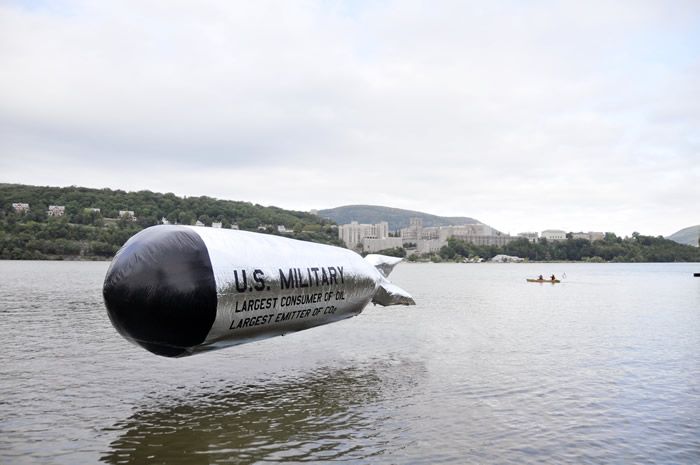Carbon Bomb Blows Up Near West Point
| 14 Sep 2014: posted by the editor - United States | |
|
Lettering on the side of the bomb read, "US Military: Largest consumer of oil, largest emitter of CO2." The carbon bomb was transported down the river by a flotilla of canoes midway through a two-week journey traversing the Hudson River down to New York for the upcoming climate mobilization. At West Point, the Sea Change Flotilla was joined by former military service members from Veterans For Peace, who plan to carry the carbon bomb in the Stop the Wars, Stop the Warming contingent at the Peoples Climate March on September 21. "The primary culprit in all this heating the planet is not you or I because we don't recycle quite enough. It is the US military, the biggest user of fossil fuels and the largest emitter of CO2 on the planet - not to mention its ongoing wars waged for resources and power - wars of destruction to people, life and the environment," said US Army veteran Tarak Kauff. As the United Nations prepares to meet in New York on September 23 to discuss climate change, one subject that will not be on the negotiating table is the emissions of the US military. Although the US military is assumed to be the largest emitter of CO2, the military is not required to report their emissions to the UN. While the Pentagon refuses to release fuel usage data, it has been estimated that the US military is responsible for five percent of total global greenhouse emissions. "In the dialogue around stopping climate change, too much emphasis is being put on ethical consumerism," said Katherine Ball of Tools for Action. "Does it really matter if we try to fly less if the US Air Force continues to burn one-fourth of the world's jet fuel? We have to address the systemic causes of climate change: the most eco-friendly thing you can do is be anti-war." For decades, the US military has been fighting wars to secure oil resources - and in the process, the US Department of Defense has consumed more energy and emitted more carbon than any other institution on Earth. In 2003, as the military prepared for the Iraq invasion, the Army estimated it would consume more gasoline in only three weeks than the Allied Forces used during the entirety of World War II. The Guardian estimates that throughout the entire Iraq War, the US military's carbon footprint was between 250-600 million tons. |
|
|
|
| Name: | Remember me |
| E-mail: | (optional) |
| Smile: | |
| Captcha | |

